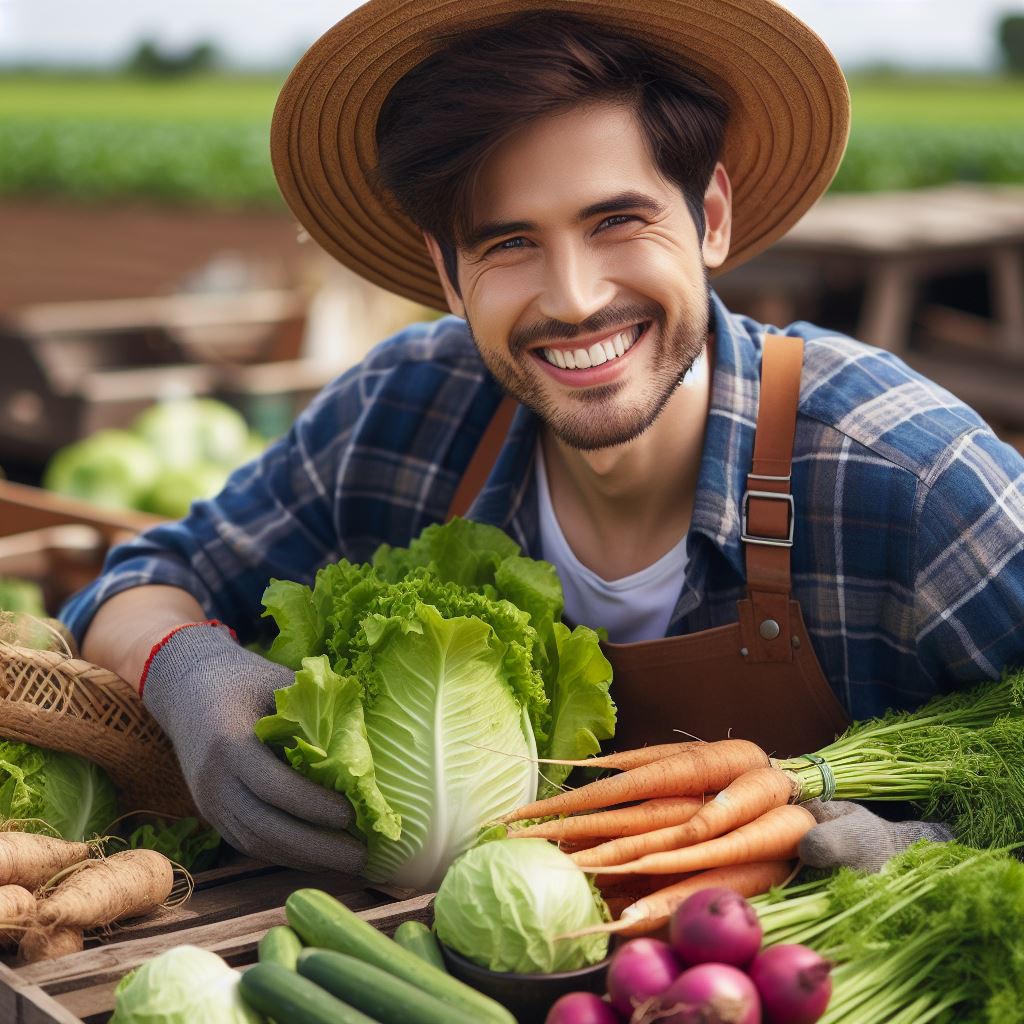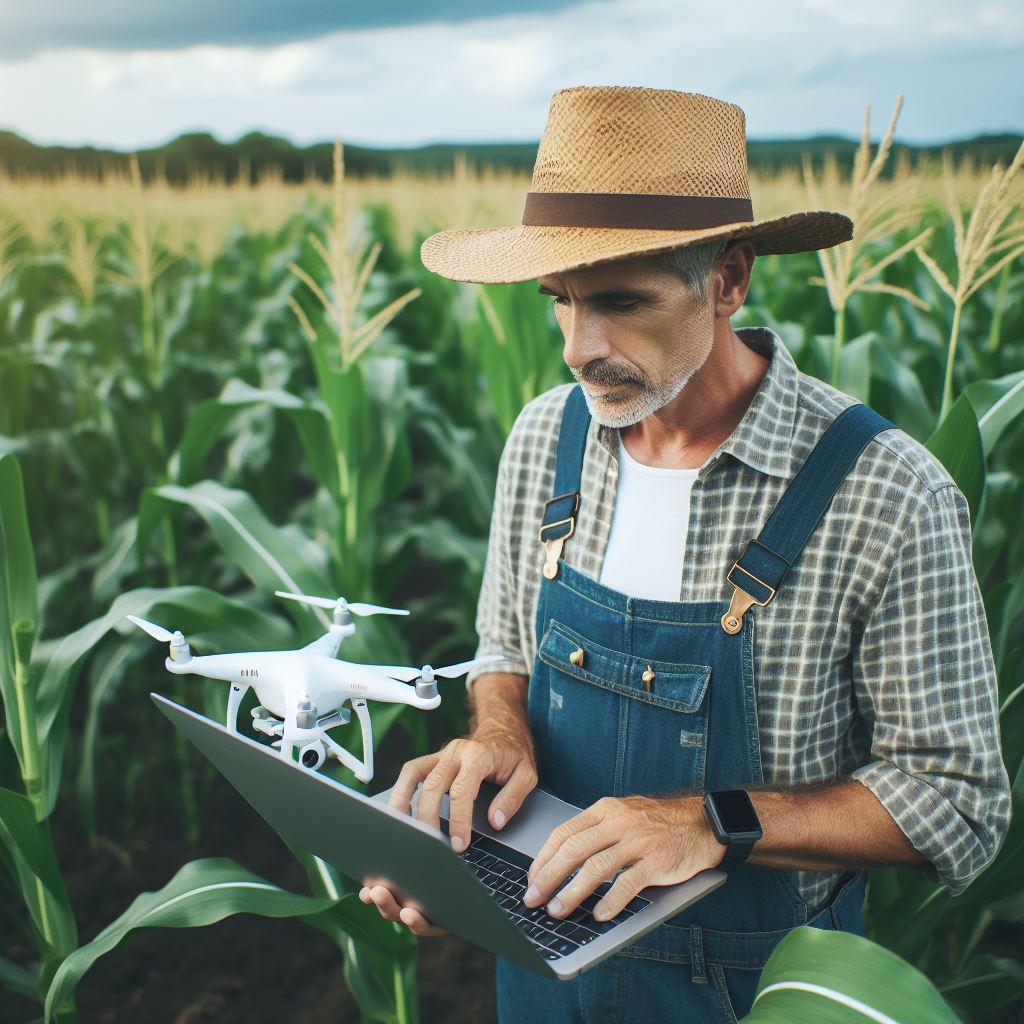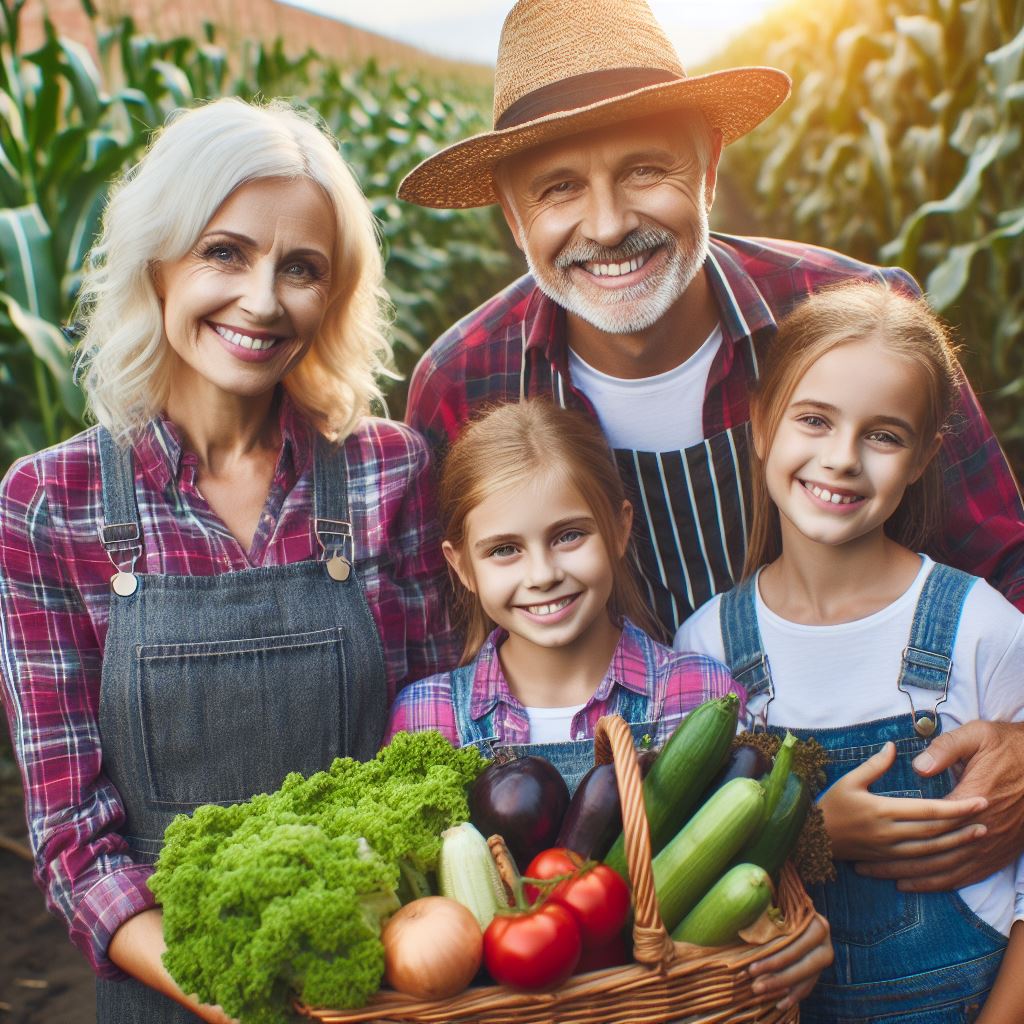Introduction
Hello and welcome to our blog! In this post, we will explore the importance of connecting with local farmers and share the inspiring story of John Doe, a farmer in our community.
Why is it crucial to connect with local farmers? Well, supporting local agriculture has numerous benefits.
By buying locally grown produce, we reduce the environmental impact of long-distance transportation and support sustainable farming practices.
John Doe’s story is a testament to the impact of this connection. Born and raised on a family farm, John inherited a deep love for the land and a commitment to providing fresh, nutritious food to his community.
His passion for farming led him to pursue sustainable farming methods, prioritizing organic practices and the well-being of his livestock.
Through painstaking efforts, John has built strong relationships with members of our community.
He understands the value of transparency and invites customers to visit his farm, fostering a sense of trust and creating a strong bond between consumers and their food sources.
In our next section, we will delve into the challenges and triumphs John experienced on his farming journey.
From weather-related setbacks to the satisfaction of feeding his neighbors, John’s story is one of resilience and dedication.
Stay tuned for an intimate glimpse into the life of a local farmer who nourishes both the land and the people.
We hope John’s story will inspire you to seek out and connect with your own local farmers.
Join us as we celebrate the remarkable individuals who work tirelessly to bring food to our tables and build sustainable communities.
Background Information on John Doe
Brief overview of John Doe’s farm
John Doe owns and operates a family farm located in the heart of our local community. His farm spans over 100 acres of fertile land, where he cultivates a wide variety of crops.
John Doe’s experience and expertise in farming
With over three decades of experience in farming, John Doe is a seasoned expert in the field.
He inherited his passion for agriculture from his parents and has been actively involved in farming since his teenage years.
Transform Your Agribusiness
Unlock your farm's potential with expert advice tailored to your needs. Get actionable steps that drive real results.
Get StartedJohn Doe’s contribution to the local community
- John Doe’s farm is not just a place where crops are grown; it plays a vital role in our community.
- Through his farm, he has created job opportunities for many local residents, strengthening the local economy.
- Beyond job creation, John Doe actively participates in various community initiatives.
- He believes in giving back to his community and has implemented sustainable farming practices to protect the environment.
- His farm serves as an educational platform, hosting field trips for local schools, where students learn about the importance of agriculture and its impact on our daily lives.
- John Doe also offers apprenticeships and mentoring programs for aspiring farmers.
- He believes in sharing his knowledge and experience to inspire the next generation of farmers to continue the legacy of sustainable and responsible farming.
- In addition to his farming expertise, John Doe is known for his philanthropic endeavors.
- He regularly donates a portion of his harvest to local food banks, ensuring that fresh, nutritious produce reaches those in need.
- He actively volunteers at community events and fundraisers, using his farm to host charity events that benefit various local organizations.
- John Doe’s commitment to the local community goes beyond the boundaries of his farm.
- He actively participates in local farmer’s markets, showcasing his produce and helping other farmers connect with consumers.
- His presence at these markets fosters a sense of community and promotes the importance of supporting local farmers.
In fact, John Doe is not just an ordinary farmer. His farm serves as a hub of community engagement, job creation, and education.
Through his expertise and dedication, John Doe continues to make significant contributions to our local community, ensuring a sustainable and prosperous future for generations to come.
Read: Growing Local: Bob’s Community Impact
Early Years in Farming
John Doe’s Childhood and Upbringing
John Doe, a farmer by heart, was raised in a small rural community surrounded by vast farmlands. From an early age, he was exposed to the sights, sounds, and smells of farming life.
As a child, John spent countless hours exploring, playing, and learning about the wonders of nature. His parents, both farmers themselves, instilled in him a deep love and respect for the land.
Influence of Family Members and Role Models on John Doe’s Career Choice
- John’s grandfather, an experienced farmer, played a significant role in shaping his career path.
- He would often take young John to the fields, teaching him the importance of hard work and dedication.
- Witnessing his family’s passion and commitment to farming, John knew from a young age that it was his calling.
- His older brother, who had already established a successful farming business, also inspired him to follow in his footsteps.
Initial Challenges and Sacrifices Faced by John Doe
- Embarking on his farming journey wasn’t easy for John, as he faced numerous challenges right from the start.
- One of the initial hurdles was acquiring enough land to begin his own farm.
- He spent years saving every penny and working odd jobs to gather the necessary funds.
- Once he finally purchased a small plot, he encountered difficulties obtaining the equipment and tools he needed.
- Undeterred, John persisted. He borrowed equipment from neighboring farmers and sought advice from seasoned professionals.
- Long hours in the field, unpredictable weather conditions, and financial instability were sacrifices John willingly made.
- He knew that success would not come overnight and that he had to put in the effort to make his dreams a reality.
In essence, John Doe’s early years in farming were shaped by his childhood experiences, family influence, and initial challenges.
His love for the land, instilled by his parents and grandparents, was the driving force behind his career choice.
Despite the obstacles he faced, John’s determination and perseverance propelled him forward to become a successful farmer.
Stay tuned for the next section, where we delve into John Doe’s journey to becoming a sustainable and community-focused farmer.
Read: Future of Farming: Olivia’s Vision
Farming Journey and Successes
John Doe’s decision to become a farmer
John Doe’s journey as a farmer began with a strong desire to connect with nature and produce sustainable, healthy food.
After years of working in the corporate world, he realized that his true passion lay in agriculture.
Driven by a longing for a simpler life and a genuine love for the land, John made the bold decision to leave his comfortable job and pursue a career in farming.
It was not an easy choice, but he believed he could make a difference and contribute to his community’s food security.
Steps taken to establish his own farm
Starting his own farm was no small feat. John knew he had to learn the ins and outs of agricultural practices, so he enrolled in farming courses and attended workshops.
He also sought guidance from experienced farmers who mentored him throughout the process.
With his newfound knowledge, John leased a piece of land and began turning it into a thriving farm. He worked tirelessly, preparing the soil, planting seeds, and tending to the crops.
It was a labor of love that required patience, dedication, and countless hours of hard work.
Notable achievements and milestones in John Doe’s farming career
- Organic Certification: John’s achievement: Obtaining organic certification by prioritizing sustainable farming, soil health, and water conservation on his farm.
- Community Engagement: John not only tended his farm but also engaged the community. He organized workshops, farm visits, and CSA programs, connecting people with food.
- Awards and Recognition: John’s commitment to sustainable farming garnered awards, validating his hard work and inspiring him to continue making a positive impact.
- Expansion and Diversification: John’s farm grew over the years, diversifying with new crops, organic livestock, and a small-scale dairy, boosting income and the local economy.
- Mentorship and Advocacy: John, an experienced farmer, mentors aspiring ones, emphasizing knowledge sharing and promoting sustainability at agricultural forums.
John Doe’s farming journey has been one of perseverance, passion, and continuous learning.
His decision to become a farmer and the steps he took to establish his farm have led to remarkable achievements and milestones.
Through his dedication and commitment, John has become an inspiration to both farmers and consumers alike, reminding us of the importance of local, sustainable agriculture.
Read: CSA: Farming for the Future

Farming Practices and Philosophy
Sustainable farming practices adopted by John Doe
John Doe firmly believes in the importance of sustainable farming practices as a means to protect the environment and ensure long-term agricultural viability.
He employs techniques such as crop rotation, cover cropping, and the use of compost to enhance soil fertility and reduce the need for chemical inputs.
Showcase Your Farming Business
Publish your professional farming services profile on our blog for a one-time fee of $200 and reach a dedicated audience of farmers and agribusiness owners.
Publish Your ProfileBy avoiding the excessive use of synthetic fertilizers and pesticides, John preserves soil biodiversity and minimizes the risk of water contamination.
Emphasis on organic farming and responsible land management
John Doe places a strong emphasis on organic farming, avoiding the use of synthetic substances and genetically modified organisms.
Through organic practices, he aims to produce food that is free from harmful chemicals and promotes a healthier lifestyle for consumers.
Responsible land management is another crucial aspect of John’s farming philosophy. He believes in preserving the natural resources present on his land.
By using conservation tillage methods and establishing buffer zones, he prevents soil erosion, improves water quality, and creates wildlife habitats.
John Doe’s commitment to animal welfare and ethical farming practices
- For John, animals are not just a source of livelihood but living beings who deserve respect and proper care.
- He ensures that his animals have access to clean water, adequate shelter, and appropriate nutrition to thrive.
- John avoids overcrowding his livestock and provides them with ample space to move and exhibit natural behaviors.
- He firmly opposes the use of antibiotics and growth hormones, instead focusing on preventive measures and natural remedies to maintain animal health.
- By following these ethical farming practices, John promotes a humane approach to livestock production and contributes to the overall well-being of his animals.
- John Doe’s farming practices prioritize environment, quality, sustainability, and ethics. Through sustainable methods like crop rotation, he maintains soil fertility.
Emphasizing organic farming, John offers chemical-free food, promoting healthier lifestyles. Responsible land management conserves resources and protects wildlife.
John’s commitment to animal welfare shines through proper care and humane livestock practices, setting him apart as a compassionate farmer.
Through all these farming practices, John Doe exemplifies his philosophy of sustainable agriculture, where environmental preservation, organic farming, responsible land management, and animal welfare are integral components.
His dedication not only benefits the environment but also provides consumers with nutritious, quality food while supporting a more sustainable and ethical food system.
Discover More: Farm-to-Table: Interactive Workshops
Discover More: Local Markets: Impact on Economy
Impact on the Local Community
John Doe’s involvement in community activities and initiatives
John Doe is not just a farmer, but also an active member of the local community. He participates in various community activities and initiatives that aim to improve the quality of life for everyone.
One of the initiatives John is involved in is the local food bank.
He donates fresh produce from his farm to help feed families in need. John understands the importance of healthy, nutritious food, and he wants to ensure that everyone has access to it.
In addition to supporting the food bank, John also volunteers at the community garden. He dedicates his time and expertise to help others learn about sustainable farming practices.
His involvement in the garden has created a sense of camaraderie and unity among community members.
Support offered to local schools and organizations by John Doe
John Doe believes in investing in the future, and that’s why he supports local schools and organizations. He regularly visits schools to educate children about the importance of farming and where their food comes from.
John also offers internships and apprenticeships to students who are interested in learning more about agriculture.
By providing hands-on experience, he helps shape the next generation of farmers and cultivates a passion for sustainable farming practices.
Furthermore, John actively collaborates with local organizations to promote environmental conservation.
He participates in clean-up campaigns, tree planting initiatives, and educational workshops that raise awareness about the importance of protecting the environment.
Benefits of buying locally from farmers like John Doe
Buying locally from farmers like John Doe has numerous benefits for the community.
- Firstly, it supports the local economy by keeping money within the community and creating jobs. When you buy directly from a farmer, you are investing in your community’s prosperity.
- Additionally, buying locally means you are getting fresh, high-quality produce.
- Since the produce doesn’t have to travel long distances, it can be picked at peak ripeness, ensuring maximum flavor and nutritional value.
- Eating locally grown food also reduces your carbon footprint as it requires fewer transportation emissions.
- Moreover, buying from local farmers fosters a sense of connection and trust. You can meet the farmers who grow your food, ask questions about farming practices, and even visit their farms.
- This transparency helps build a stronger relationship between farmers and consumers, resulting in a healthier and more sustainable food system.
In short, John Doe’s impact on the local community is immeasurable.
Through his involvement in community activities, support to local schools and organizations, and the benefits of buying locally, John is making a difference.
He exemplifies the importance of being an active member of the community and the positive effects it can have on everyone involved.
By supporting farmers like John, we not only contribute to a thriving local economy but also promote sustainable farming practices and strengthen community bonds.
Challenges and Future Plans
Obstacles encountered by John Doe in the farming industry
- Limited access to capital: Securing funds for purchasing new equipment and expanding operations was challenging for John Doe.
- Adverse weather conditions: Unpredictable weather patterns often damaged crops and affected the overall yield in John’s farm.
- Market competition: Competing with large-scale industrial farms was difficult due to their greater resources and economies of scale.
- Labor shortage: Finding skilled and reliable labor was a recurring challenge for John, impacting the efficiency and productivity of his farm.
Strategies implemented to overcome these challenges
- Diversification: John reduced his reliance on a single crop by diversifying his farm’s offerings, which helped mitigate the impact of unfavorable weather.
- Collaborations: John formed partnerships with neighboring farmers to share resources, equipment, and knowledge, improving efficiency and reducing costs.
- Improved financial planning: John worked closely with financial advisors to create a long-term plan, seeking grants and loans to fund his farm’s growth.
- Embracing technology: John invested in modern farming techniques, such as precision agriculture and automated machinery, to maximize yields and minimize labor requirements.
John Doe’s vision for the future of his farm and the local farming community
- Sustainable farming practices: John aims to adopt more sustainable farming methods to protect the environment and preserve natural resources for future generations.
- Education and advocacy: John plans to educate the local community about the benefits of supporting local farmers and the importance of sustainable food systems.
- Collaboration and support: John envisions creating a network of local farmers to exchange knowledge, share resources, and collectively address challenges faced by the community.
- Community involvement: John wants to actively engage the local community by organizing farm visits, workshops, and events to foster a deeper connection between consumers and farmers.
- Market expansion: John aims to establish strong partnerships with local restaurants, farmers’ markets, and grocery stores to increase the demand for locally produced food.
Basically, John Doe has encountered various obstacles in his farming journey, including limited access to capital, adverse weather conditions, market competition, and labor shortages.
However, he has successfully overcome these challenges through diversification, collaborations, improved financial planning, and embracing technology.
Looking forward, John is committed to sustainable practices, education, collaboration, and community involvement to secure a prosperous future for his farm and the local farming community.
Read: Community Gardens: Farm-to-Table Heroes
Conclusion
In John Doe’s journey, sustainable farming thrived. Crop rotation and organic practices ensured soil health and fertility.
His commitment extended to chemical-free produce, promoting healthier lifestyles. Responsible land management preserved resources and wildlife habitats.
John’s dedication to animal welfare set a compassionate standard. Proper care ensured livestock well-being, reflecting a humane approach.
Recapping his achievements, John’s farm expanded, diversifying crops, embracing organic livestock, and starting a small-scale dairy. The local economy flourished.
John’s mentoring role benefits aspiring farmers. He shares knowledge, advocating sustainability at agricultural forums, fostering a community of responsible farmers.
Support local farmers. Their dedication impacts the environment, provides quality produce, and sustains ethical practices. Choose local for a healthier, compassionate future.
Knowing your local farmer is crucial. It ensures transparency, promotes sustainable agriculture, and builds a resilient, connected community.




